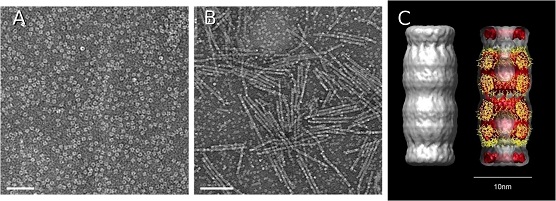Lab Members
Ellie Banwell

Postdoctoral Researcher
Heddle Initiative Research Unit
RIKEN
Email: e.banwell at riken.jp
Research Interests
Iterative peptide and protein design is a powerful tool in the design of novel biomaterials and for answering the fundamental questions of biology. I am working on three projects that apply peptide design to a wide variety of applications:
-
I have used systematic mutation to elucidate the assembly mechanism of a protein nanotube (Fig. 1). We have applied the information learned from this approach to produce other materials of interest for future development, for example, arrays of protein rings.

- I have begun the design of a quick-release self-assembling peptide gel for use as a substrate for the growth of 2D cell sheets. The gel will support cell growth but dissolve to release complete cell sheets without the need for trypsin digestion or other deleterious release mechanisms. The method is aimed at the production of cell-sheets for the layer-by-layer assembly of 3D engineered tissues.
- I am applying our iterative design method to the development of a novel self-replicating peptide system. The system utilizes a new method of thioester generation able to produce peptide thioesters in solution under mild conditions analogous to those present on early Earth (Kang et al). It is hoped that the system will answer questions surrounding the earliest emergence of peptide replication and life on Earth.
J. Kang, N. L. Reynolds, C. Tyrrell, J. R. Dorin, and D. Macmillan, Organic & biomolecular chemistry, 2009, 7: 4918-23.
Figure 1. TEM micrographs showing TRAP rings (A) prior to and (B) following reaction with DDT. C) Single particle analysis showing head to tail arrangement of TRAP rings within the assembly


